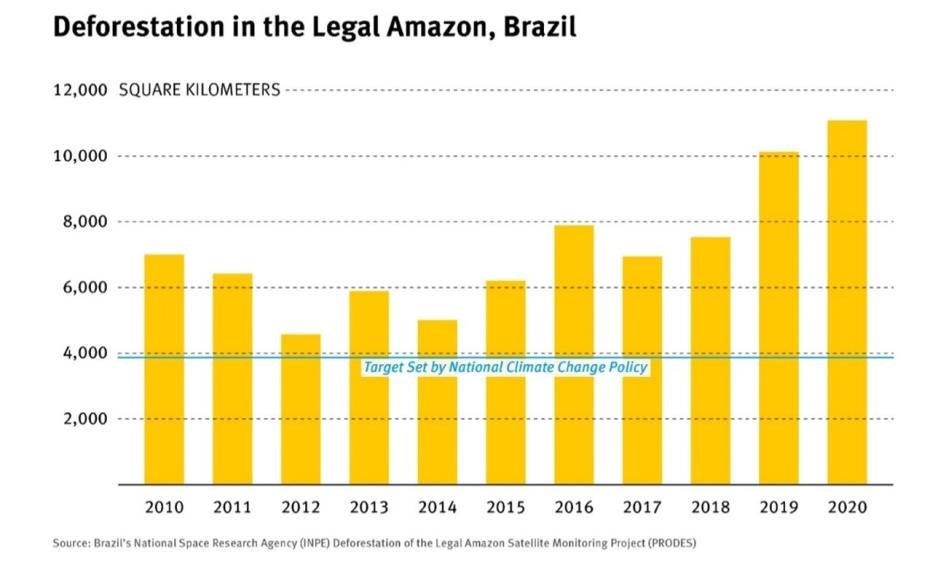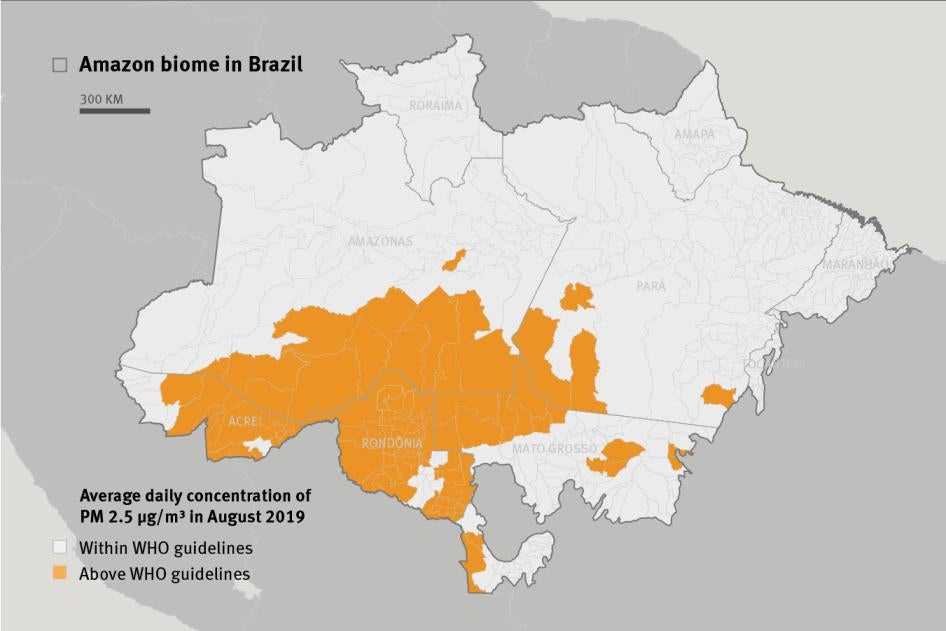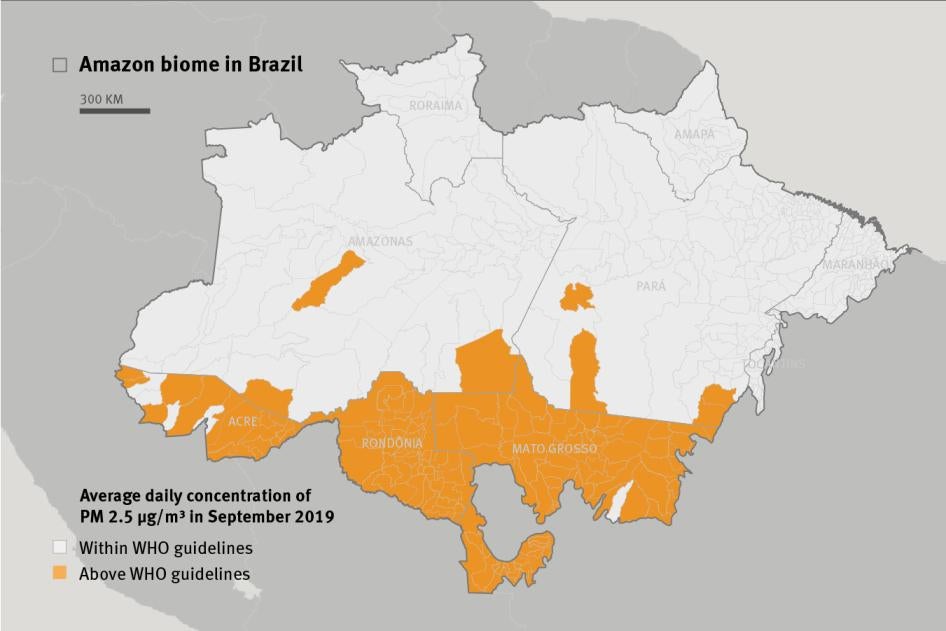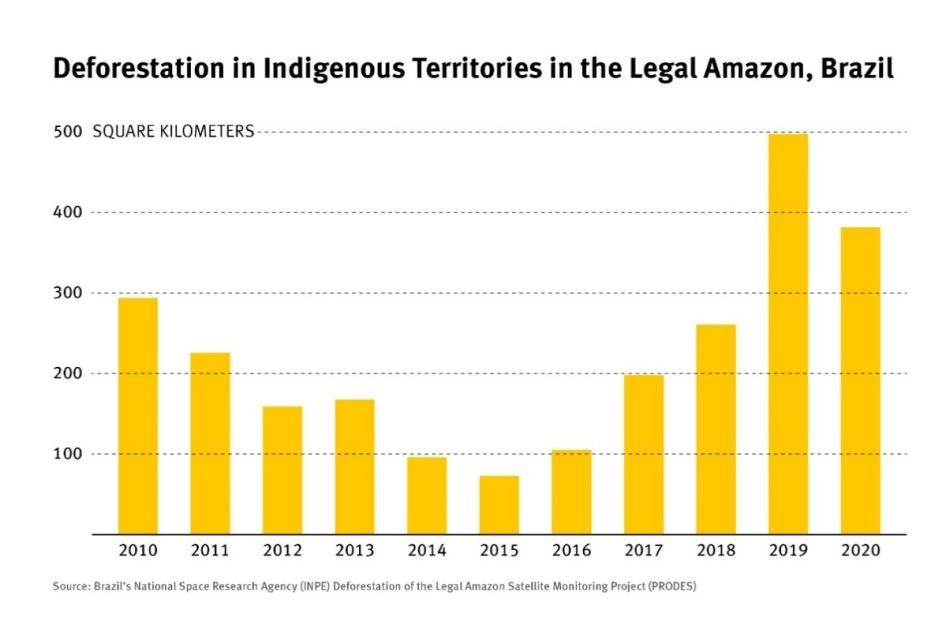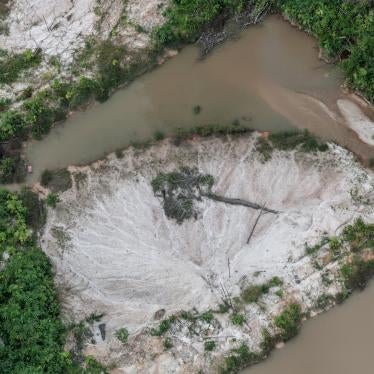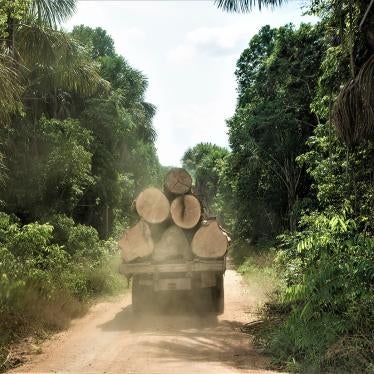I. Deforestation
Deforestation in the Brazilian Amazon has increased dramatically since President Bolsonaro took office in 2019. The increase was more than 30 percent during the first year of his administration and an additional 9.5 percent during the second year, according to official figures.[1] In 2020, more than 11,000 square kilometers of rainforest were lost, nearly triple the 3,925 square kilometers target that Brazil committed itself to reaching by 2020 as part of its National Climate Change Policy.[2]
The accelerated destruction of the Brazilian Amazon could have devastating consequences for the region and for global efforts to mitigate climate change. Scientists estimate that 17 percent of all the Amazon has already been deforested. If the current rate of destruction continues, between 20 and 25 per cent of the rainforest could be cleared in under two decades, pushing the Amazon towards a tipping point when vast portions of the rainforest would turn into dry savannah, decimating Brazilian agriculture, altering weather patterns and water cycles across South America, and releasing billions of tons of carbon into the atmosphere.[3]
The Deforestation of the Legal Amazon Satellite Monitoring Project (PRODES), a system run by Brazil’s National Space Research Agency (INPE), produces annual official estimates of clear-cut deforestation in the Brazilian Amazon through analysis of satellite imagery.[4] As evidenced by PRODES figures, deforestation during the first two years of Bolsonaro presidency is significantly higher than any other year during the past decade (see graph below).
The figures provided by PRODES cover 12-month periods from August to July and do not include month-to-month tallies. However, another system also run by INPE, the Real-Time Deforestation Detection System (DETER), includes monthly estimates indicating that more than two thirds of the deforestation in the period between August 2018 and June 2019 took place after President Jair Bolsonaro took office.[5] (DETER provides near real-time alerts of deforestation based on satellite imagery to guide environmental enforcement efforts. The alerts are an indication of deforestation but, because of cloud cover and other factors, they often underestimate total deforestation in relation to PRODES.) [6]
II. Forest Fires
Forest fires are closely linked to deforestation in Brazil. They do not occur naturally in the wet ecosystem of the Amazon basin, but rather are frequently started by people completing the process of deforestation after the trees of value have already been removed. A total of 55 percent of the area cleared in the rainforest in 2019 was burned, equivalent to over 5,500 square kilometers.[7] Data is not available for the area deforested and burned in 2020, but the number of fires detected in 2020 increased by 15.7 percent in relation to 2019.[8]
The impact of these fires extends beyond the deforested lands when they spread to the remaining forest, destroying healthy trees, and opening up the overstory. This enables more sunlight to penetrate the forest, drying up vegetation on the ground and making it more flammable, leaving the forest more vulnerable for the next burning season.
In addition to the environmental consequences, the forest fires linked to deforestation produce air pollution that has a significant negative impact on public health in the Amazon region. In 2019, the pollution from the fires led to 2,195 hospitalizations due to respiratory illness, according to a report by Human Rights Watch, the Instituto de Pesquisa Ambiental da Amazônia (IPAM) and the Instituto de Estudos para Políticas de Saúde (IEPS) that analyzed official health and environmental data.[9]
Hospitalizations are a small fraction of the overall health toll of the fires. In total, the air pollution affected millions of people. In August 2019, nearly 3 million people in the Amazon region were exposed to harmful air pollution levels above the World Health Organization’s recommended threshold. The number increased to 4.5 million people in September, the report showed (see graphs below). [10]
III. Criminal Networks, Violence, and Lawlessness
The destruction of the Brazilian Amazon is driven largely by criminal networks that employ violence and intimidation against those who seek to protect the rainforest.
- Much of the illegal logging in the Amazon is carried out by criminal networks that have the logistical capacity to coordinate large-scale lumber extraction. These mafias are often led by fazendeiros (ranchers or large farmers in Portuguese) who provide the capital to buy heavy equipment and hire workers, coordinate with sawmills, and arrange methods to pass illegally-harvested timber as a legal product. They hire local men to work in the forest for weeks at a time, opening paths within Indigenous territories and other federal and state forests using chainsaws, tractors, and trucks to extract the most valuable timber. They typically then cut down the remaining vegetation, a process that is labor-intensive and requires substantial investment. Once cut vegetation is dry, they set it on fire.[11]
- The cleared lands are usually turned into grass land for cattle; more than 60 percent of deforested areas end up as cattle ranches, while 6 percent are used for crops.[12] The criminal networks may keep those lands, dividing them into smaller plots and fabricating titles to the name of frontmen. Or they may raise cattle there for a few years, when the land is most productive, and then sell it, again with fabricated titles, a practice known as grilagem in Brazil. For this, they count on other actors in the criminal networks: experts in geoprocessing who forge land surveys to register lands occupied by fazendeiros. Some criminal networks are also involved in illegal mining in the areas they control. To protect and further their business, they sometimes bribe public officials and police.[13]
- The criminal networks engaged in illegal deforestation in the Amazon use violence and intimidation against anyone who threatens their illegal activities. A 2019 Human Rights Watch report documented 28 killings — as well as four attempted killings and more than 40 cases of death threats — linked to illegal deforestation. Some of these victims were environmental enforcement officials. Most were members of Indigenous communities or other forest residents who reported illegal logging to authorities or sought in other ways to contribute to Brazil’s efforts to enforce its environmental laws.[14]
- Indigenous peoples and local communities have always played an important role in efforts to counter illegal deforestation by providing government authorities with tips about environmental crime. This role has become even more crucial as the country’s environmental institutions have weakened in recent years and the number of field agents has been reduced. However, the retreat of environmental enforcement officials and increased impunity for environmental crime also puts front line communities at greater risk.[15]
IV. Weakened Environmental Agencies
Since President Bolsonaro took office in 2019, his administration has moved aggressively to undermine the enforcement of environmental laws in Brazil.
- The Bolsonaro administration has weakened the country’s main federal environmental enforcement agency, the Brazilian Institute of the Environment and Renewable Natural Resources (IBAMA). Shortly after beginning his term, at an agribusiness fair attended by landowners, President Bolsonaro said he had ordered Environment Minister Ricardo Salles to “clean out” IBAMA.[16] Subsequently, Minister Salles removed 21 of the 27 regional directors who were responsible for anti-logging operations, marking the largest such removal in the institution’s thirty-year history.[17] An inspection by a federal oversight body concluded that several of the replacements appointed by Minister Salles did not meet the minimum requirements for the positions they filled; these included the new directors for Mato Grosso, Pará—Brazil’s largest timber producers—and four other Amazon states.[18]
- While numbers have declined over the years, under the Bolsonaro administration they have drastically diminished: IBAMA employed 780 inspectors throughout Brazil when President Bolsonaro took office in 2019. That number dropped to 667 by 2020.[19] (In 2009, IBAMA had employed 1,600 inspectors.) Inspectors conduct field monitoring and are deployed for environmental law enforcement, including fining loggers and confiscating their equipment. Only a fraction of these inspectors is devoted to the Amazon region, leaving large swaths of the rainforest with limited presence of inspectors. For instance, in May 2019 there were only eight IBAMA inspectors for the rainforest that covers the western half of Pará, an area almost as big as France.[20]
- In addition to being severely understaffed, environmental agencies are also facing historic budgetary cuts. The 2021 budget proposed by the federal government for its environmental agencies is the lowest in 13 years, according to data from the Brazilian transparency research center Contas Abertas. The government’s budget proposal for the Environment Ministry, the agencies under its administration and other environment-linked expenditures programs is 2.9 billion reais (US$530.50 million). That represents a 5.4 percent drop from the government’s budget proposal for environmental protection last year, down to the lowest level in the Contas Abertas analysis going back to 2008.[21]
- The government has also imposed strict restrictions on environmental agencies’ ability to share information directly with the media, undermining accountability and transparency. In March 2019, news reports stated that Minister Salles had decided that the Environment Ministry would manage the press requests addressed to IBAMA and another environmental enforcement agency, interfering with the autonomy of these two federal bodies. (Minister Salles had previously also dismissed IBAMA’s head of communications.)[22] Subsequently, in March 2020, the president of IBAMA– an appointee of Minister Salles–required that IBAMA officials report any attempt by a journalist to contact them.[23]
- In February 2020, President Bolsonaro issued a decree creating an ‘Amazon Council’ charged with protecting the rainforest.[24] The vice-president, a retired army general, presides over the council and has the authority to make all final decisions, side-lining seasoned environmental officials to secondary roles.[25] As part of the move to centralize command control in the Amazon Council, in May 2020 the federal government transferred responsibility for leading environmental enforcement efforts in the Amazon from IBAMA and other environmental agencies to the armed forces, which do not possess the technical expertise nor training necessary to fulfil this role.[26]
- The armed forces have been largely ineffective at curbing environmental destruction of the Brazilian Amazon. The extension of public forests illegally deforested was 2,265 square kilometers in 2020, in comparison to an average of 1,128 square kilometers between 2014 and 2018, indicating a surge in invasions of public lands under the army’s watch.[27] The number of fires detected in the Amazon in 2020 was 15.7 percent higher than in 2019, despite a decree issued by the federal government in mid-July prohibiting the burning of vegetation in the Amazon for four months.[28]
V. Impunity for Illegal Deforestation and Violence
The crisis in the Brazilian Amazon persists largely because of impunity. Most of the deforestation there is illegal, yet the Bolsonaro administration has slashed the number of fines for illegal logging and other environmental law violations, and barely enforced those that have been issued. Likewise, the acts of violence and intimidation linked to illegal deforestation routinely go unpunished.
- Under the Bolsonaro administration, the number of environmental fines issued by IBAMA for illegal deforestation and other environmental infractions has dropped dramatically. In previous years, IBAMA had issued an average of 16,000 fines every year. In 2019, it issued only 11,914. In 2020, that number dropped to 9,516, the lowest in 20 years, and 40 percent below the average.[29] President Bolsonaro publicly celebrated the decrease in fines and promised these would continue to be slashed: “in the first two months of this year we had the least fines issued in the field and these will continue to diminish,” he said in June 2019, “we will end this fine industry.”[30]
- In addition to issuing fewer fines, the Bolsonaro administration effectively stopped enforcing the fines that it issued. In October 2019, it implemented new procedures establishing that environmental fines should be reviewed at “conciliation hearings,” in which a commission can offer discounts or eliminate the fine altogether. The Environment Ministry suspended all deadlines to pay those fines until a hearing could be held. Between October 2019 – when the decree came into force – and November 2020, federal environmental agencies held only five such conciliation hearings.[31] In practice, this means that the requirement to pay for nearly all the fines imposed during that period of more than a year was effectively suspended. In November 2020, the Ministry of Environment established through a new ordinance that those fined for environmental infractions would have 30 days to opt for the conciliation hearing; if there is no interest in attending a hearing, deadlines to pay or challenge the fine must resume. The new system will have to contend with a backlog of thousands of unpaid fines.[32]
- A 2019 Human Rights Watch report documented a systematic failure to properly investigate and prosecute acts of violence and intimidation linked to illegal logging. Of the 28 killings documented report, only two had gone to trial, and of the more than 40 cases of threats, none had.[33] Over the past decade, more than 300 people were killed in conflicts over the use of land and resources in Amazonian states — many of them by people involved in illegal deforestation — according to data provided to Human Rights Watch by the Pastoral Land Commission (CPT), a non-profit organization that has offices across the country to provide legal and other aid to victims. Only a small fraction of these killings has gone to trial.[34]
VI. Undermining Protection of Indigenous Territories
The demarcation and protection of Indigenous territories has been a cornerstone of successful conservation efforts in the Amazon, as well as a fundamental step toward the recognition and respect of Indigenous rights.[35] Under the Bolsonaro administration, illegal incursions and environmental destruction within these areas have greatly increased, encouraged by the president’s rhetoric and actions to undermine oversight of these territories.[36]
- Since President Bolsonaro took office in January 2019, the federal government has not demarcated any new Indigenous territories, even though the constitution requires it to demarcate and protect such territories.[37] (There are currently 237 pending requests for demarcation.[38]) President Bolsonaro vowed not to designate “one more centimeter” of land as Indigenous territory and tabled a bill in Congress to open up Indigenous land to mining and other commercial enterprises.[39]
- In April 2019, the Bolsonaro government eliminated by decree the committee to implement the National Policy of Environmental and Land Management in Indigenous Territories, designed to promote environmental protection in Indigenous territories.[40]
- During President Bolsonaro’s first year in office, there was a 135 percent increase in illegal invasions, illegal logging, land grabbing, and other infringement upon Indigenous areas, according to the Indigenist Missionary Council (CIMI), a non-profit organization.[41]
- Under Bolsonaro, deforestation in Indigenous lands is higher than it has been over the past ten years, and 2019 marked the worst year since Brazil began monitoring deforestation in Indigenous territories, according to data from INPE.[42] While 2020 registered a decrease compared to the 2019 peak, deforestation in Indigenous territories remained significantly higher than in previous years on record (see graph below).
VII. Corruption Linked to Environmental Destruction
Corruption and money-laundering facilitate environmental crimes and undermine enforcement of environmental regulations in the Brazilian Amazon.
- In the states of Mato Grosso and Pará, Brazil’s two main producers of timber, 39 percent and 70 percent respectively of timber production exploitation is carried out in violation of logging regulations and laws, studies by Brazilian environmental research centres have shown.[43] Environmental crimes such as these are made possible by widespread fraud in Forest Management Plans and forged documentation that misrepresents the origin of timber, major investigations by the Office of the Federal Prosecutor suggest.[44] Those investigations indicate that these “timber laundering” schemes are sometimes facilitated by corrupt public servants who allegedly received bribes in exchange for approving fraudulent documents or turning a blind eye to environmental crimes.[45]
- There have been significant setbacks in anti-corruption governance under the Bolsonaro administration, according to Transparency International Brazil, including growing political interference in the bodies responsible for preventing and combating corruption and money-laundering. [46]
- The Bolsonaro administration has also dismantled transparency and participatory governance mechanisms. For instance, it reduced civil society representatives in the National Council for the Environment (CONAMA) and the Climate Fund’s steering committee.[47] Meanwhile, high-level officials – including the president and vice-president – have questioned the data on deforestation produced by INPE, without producing evidence of any inaccuracies in the data from the government’s own institution, in an apparent attempt to reduce transparency on pressing environmental issues.[48]
VII. Hostility Toward Civil Society
The Bolsonaro administration has lashed out at nongovernmental organizations, particularly those defending the environment. President Bolsonaro has accused them, without any proof, of causing the destruction of the rainforest. Furthermore, his administration has repeatedly sought to sideline civil society from policy making.
- In August 2019, President Bolsonaro accused environmental groups of setting fires in the Amazon to embarrass his government, without presenting any evidence to that effect.[49] Three months later, police arrested four volunteer firefighters in Pará and accused them, without evidence, of starting the fires to attract attention and raise funds.[50] (The federal prosecutor’s office ended the investigation in February 2021 after failing to produce evidence implicating the volunteers.[51]) In September 2020, Bolsonaro blamed Indigenous people and small farmers, again without evidence, for Amazon fires in his speech at the United Nations General Assembly.[52]
- President Bolsonaro and Environment Minister Salles co-signed a decree that modified the composition of the National Environmental Council (CONAMA), an advisory and deliberative council that sets rules for the licensing of polluting industries and establishes nationwide parameters for air quality, among others. While in its original configuration nearly a quarter of CONAMA’s seats were reserved for civil society representatives, in May 2019 Bolsonaro adopted a decree that increased the federal government’s representation from 29 to 44 percent, and reduced representation of civil society from 24 to 17 percent, leaving the latter with four seats assigned by a lottery system for one-year terms. Civil society organizations previously had selected representatives to fill most of the seats reserved for them, and they were appointed for two-year terms.[53] In 2019, the Attorney General’s Office filed a petition before the Federal Supreme Court challenging the decree.[54] The petition remains pending before the court.
- Another target of the Bolsonaro administration’s efforts to diminish the participation of civil society in environmental governance was the Amazon Fund, a mechanism devised for the international community to financially reward progress in deforestation reductions in the Brazilian Amazon. Brazil administers the fund, to which Norway and Germany are the largest contributors. In June 2019, the government dissolved the Fund’s Steering Committee, which was responsible for approving the conservation projects to receive funding and which included representatives from civil society and scientific experts, prompting donors to freeze disbursements.[55] In 2020, several political parties filed a petition with the support of leading civil society organizations before the Federal Supreme Court to require the federal government to take steps for the immediate resumption of the Amazon Fund.[56]
- In December 2019, the Bolsonaro administration also modified the composition of the steering committee of the Climate Fund, a financial body established pursuant to Brazil’s National Policy on Climate Change (PNMC), and excluded nearly all representatives of civil society while creating new seats for business lobbies.[57]
- Minister Salles has repeatedly pursued legal action against individuals who have questioned his record. In September 2020, Minister Salles petitioned a federal court to order a leading environmental defender to explain comments criticizing the minister, a measure seemingly intended to intimidate the defender.[58] He pursued a similar action against a scientist at INPE who publicly referred to him as a “convicted criminal” in an interview about deforestation, according to press reports. (Salles had not in fact been convicted of a crime. Rather, iIn 2018, prior to Salles becoming environment minister, a state court found Salles him guilty of “administrative impropriety” for actions taken during his tenure as head of Sao Paolo’s state environment agency. He appealed the ruling and the verdict, and it was reversed on March 4, 2021.)[59])
- In September 2020, President Bolsonaro called NGOs working in the Amazon a “cancer” that he “can’t kill,” and accused them, without any proof, of being responsible for the destruction of the rainforest.[60]
- The Bolsonaro administration deployed Brazil’s secret service to spy on the Brazilian delegation, NGOs, and others at the December 2019 UN Climate Change Conference in Madrid, according to media reports.[61]
[1] For annual deforestation data, see National Space Research Agency of Brazil (INPE), “Monitoramento do Desmatamento da Floresta Amazônica Brasileira por Satélite,” http://www.obt.inpe.br/OBT/assuntos/programas/amazonia/prodes/prodes (accessed January 26, 2021), and for details on the PRODES monitoring system see “Nota técnica: Estimativa do PRODES,” 2020 http://www.obt.inpe.br/OBT/noticias-obt-inpe/estimativa-de-desmatamento-por-corte-raso-na-amazonia-legal-para-2020-e-de-11-088-km2/NotaTecnica_Estimativa_PRODES_2020.pdf (accessed January 14, 2021).
[2] Brazil pledged at the 2009 United Nations Climate Change Conference, known as the Copenhagen Summit, to reduce deforestation in the Amazon region by 80 percent by 2020 compared to average annual deforestation in the region between 1996 and 2005. That average was 19,625 square kilometers, which means that to achieve its pledge, Brazil would have to reduce deforestation to 3,925 square kilometers per year by 2020. Brazil established a National Policy on Climate Change by law in 2009, implemented by Decree 7,390 in 2010, which was replaced by Decree 9,578 in 2018. The decrees incorporated into domestic law the pledge that Brazil made at the Copenhagen Summit. Law 12,187, December 29, 2009, http://www.planalto.gov.br/ccivil_03/_ato2007-2010/2009/lei/l12187.htm (accessed June 30, 2019); Decree 9,578, November 22, 2018, http://www.planalto.gov.br/ccivil_03/_Ato2015-2018/2018/Decreto/D9578.htm (accessed January 26, 2021). For the deforestation data, see National Space Research Agency of Brazil (INPE), Nota técnica: Estimativa do PRODES, 2020 http://www.obt.inpe.br/OBT/noticias-obt-inpe/estimativa-de-desmatamento-por-corte-raso-na-amazonia-legal-para-2020-e-de-11-088-km2/NotaTecnica_Estimativa_PRODES_2020.pdf (accessed January 14, 2021).
[3] Thomas E. Lovejoy and Carlos Nobre, “Amazon Tipping Point”, Nature, Science Advances 21 Feb 2018: Vol. 4, no. 2, https://advances.sciencemag.org/content/4/2/eaat2340 (accessed January 25, 2021); Thomas E. Lovejoy and Carlos Nobre, “Amazon tipping point: Last chance for action,” Science Advances 20 Dec 2019:Vol. 5, no. 12, https://advances.sciencemag.org/content/5/12/eaba2949 (accessed January 25, 2021).
[4] Brazil’s “Amazon” refers to the area known as “Legal Amazon” under Law 1,806/1953 that includes the states of Acre, Amapá, Amazonas, Mato Grosso, Pará, Rondônia, Roraima, Tocantins, and the western part of Maranhão. (Law 1,806/1953).
[5] Between August and December 2018, there were 2,142.13 square kilometers clear cut in the Legal Amazon, in comparison to 4,701.78 between January and July 2019, when President Bolsonaro was in office. See INPE’s DETER figures: http://terrabrasilis.dpi.inpe.br/app/dashboard/alerts/legal/amazon/aggregated/ (accessed January 26, 2021).
[7] Moutinho, P., Alencar, A., Arruda, V., Castro,I., e Artaxo, P., “Nota técnica nº 3: Amazônia em Chamas - desmatamento e fogo em tempos de covid-19,” Instituto de Pesquisa Ambiental da Amazônia, Brasília, 2020, https://ipam.org.br/bibliotecas/amazonia-em-chamas-4-desmatamento-e-fogo-em-tempos-de-covid-19-na-amazonia/ (accessed July 20, 2020).
[8] DW, Brasil encerra 2020 com maior número de focos de queimadas em uma década, January 3, 2021, https://www.dw.com/pt-br/brasil-encerra-2020-com-maior-n%C3%BAmero-de-focos-de-queimadas-em-uma-d%C3%A9cada/a-56119157 (accessed January 15, 2021).
[9] Human Rights Watch, IPAM, IEPS, “ ‘The Air is Unbearable’: Health Impacts of Deforestation-Related Fires in the Brazilian Amazon,” August 2020, https://www.hrw.org/report/2020/08/26/air-unbearable/health-impacts-deforestation-related-fires-brazilian-amazon
[10] Ibid.
[11] Human Rights Watch, “Rainforest Mafias: How Violence and Impunity Fuel Deforestation in Brazil’s Amazon,” September 17, 2019, https://www.hrw.org/report/2019/09/17/rainforest-mafias/how-violence-and-impunity-fuel-deforestation-brazils-amazon
[12] A study by INPE and the Brazilian Company for Agricultural Research (EMBRAPA), a government-owned company, showed 62 percent of the deforested areas in the Amazon region in 2014 were turned into grass for cattle ranching. Only 6 percent of deforested areas were dedicated to crops, and 0.2 percent to mining. The rest was covered by secondary vegetation. Similar percentages were registered in years prior to 2014. No updated data is available. “TerraClass 2004 a 2014. Dinâmica na cobertura e no uso da terra no periodo de 10 anos nas áreas deflorestadas da Amazônia Legal Brasileira,” TerraClass Project Powerpoint presentation, May 5, 2016, copy on file at Human Rights Watch. For a description of TerraClass Project see its website: https://www.terraclass.gov.br/ (accessed August 8, 2019).
[13] A white paper by the Climate Policy Initiative found that crime and corruption are “deeply ingrained in the illegal practice of land occupation and conversion of vegetation” in Brazil and concluded that combating illegal deforestation requires combating crime and corruption. Juliano Assunção and Clarissa Gandour, “Combating Illegal Deforestation. Strengthening Command and Control is Fundamental,” Climate Policy Initiative White Paper, February 2019, https://climatepolicyinitiative.org/publication/combating-illegal-deforestation/ (accessed June 22, 2019).
[14] Human Rights Watch, “Rainforest Mafias: How Violence and Impunity Fuel Deforestation in Brazil’s Amazon,” September 17, 2019, https://www.hrw.org/report/2019/09/17/rainforest-mafias/how-violence-and-impunity-fuel-deforestation-brazils-amazon
[15] Ibid.
[16] “Bolsonaro diz que negociou com ministro do Meio Ambiente 'uma limpa' no IBAMA e no ICMBio,” G1, April 29, 2019, https://g1.globo.com/sp/ribeirao-preto-franca/noticia/2019/04/29/bolsonaro-diz-que-negociou-com-ministro-do-meio-ambiente-uma-limpa-no-ibama-e-no-icmbio.ghtml (accessed June 19, 2019).
[17] “Ricardo Salles exonera 21 dos 27 superintendentes regionais do Ibama,” Folha de São Paulo, February 28, 2019, https://www1.folha.uol.com.br/ambiente/2019/02/ricardo-salles-exonera-21-dos-27-superintendentes-regionais-do-ib.shtml
[18] The evaluation was conducted by Brazil’s Federal Court of Accounts (TCU), which is responsible for the accounting, financial, budgetary, operational and patrimonial inspection of public bodies and entities in the country as to legality, legitimacy and economy, see TCU, Institucional: https://portal.tcu.gov.br/institucional/conheca-o-tcu/competencias/ (accessed January 26, 2021). The news outlet Estadao obtained the TCU report and published its conclusions; see André Borges, “Nomeações de militares por Salles no Ibama são irregulares, aponta auditoria do TCU,” Estadao, November 11, 2020, https://politica.estadao.com.br/noticias/geral,nomeacoes-de-militares-por-salles-no-ibama-sao-irregulares-aponta-auditoria-do-tcu,70003510029 (accessed January 26, 2021). The other regional directors evaluated and deemed unsuitable were in Amapá, Amazonas, Maranhão and Rondônia.
[19] Human Rights Watch, “Rainforest Mafias: How Violence and Impunity Fuel Deforestation in Brazil’s Amazon,” September 17, 2019, https://www.hrw.org/report/2019/09/17/rainforest-mafias/how-violence-and-impunity-fuel-deforestation-brazils-amazon. Open letter by IBAMA agents to IBAMA president, August 26, 2019, copy on file at Human Rights Watch. Letter from IBAMA staff to IBAMA president Eduardo Bim, July 21, 2020, http://www.ascemanacional.org.br/wp-content/uploads/2020/07/SEI_IBAMA-8011719-Manifestac%CC%A7a%CC%83o-Te%CC%81cnica.pdf (accessed March 10, 2021).
[20] Human Rights Watch, “Rainforest Mafias: How Violence and Impunity Fuel Deforestation in Brazil’s Amazon,” September 17, 2019, https://www.hrw.org/report/2019/09/17/rainforest-mafias/how-violence-and-impunity-fuel-deforestation-brazils-amazon.
[21] Jake Spring, “Brazil proposes cuts to 2021 budget for environmental protection as deforestation spikes,” Reuters, January 25, 2021, https://www.reuters.com/article/us-brazil-environment/brazil-proposes-cuts-to-2021-budget-for-environmental-protection-as-deforestation-spikes-idUSKBN29U26S (accessed January 26, 2021).
[22] Fernando Tadeu Moraes, “Ministério do Meio Ambiente impõe mordaça ao Ibama,” Folha de Sao Paulo, March 13, 2019, https://www1.folha.uol.com.br/ambiente/2019/03/ministerio-do-meio-ambiente-impoe-mordaca-ao-ibama.shtml (accessed January 26, 2021). Ordinance n° 202, March 11, 2019, https://www.in.gov.br/web/dou/-/portaria-n-202-de-11-de-marco-de-2019-66758558 (accessed January 26, 2021).
[23] Leandro Prazeres, “Presidente do Ibama publica portaria e restringe contato de funcionários com a imprensa,” O Globo, March 5, 2020, https://oglobo.globo.com/sociedade/presidente-do-ibama-publica-portaria-restringe-contato-de-funcionarios-com-imprensa-24288119 (accessed January 26, 2021).
[24] Decree n° 10,239/2020, February 11, 2020, Art. 3, http://www.planalto.gov.br/ccivil_03/_ato2019-2022/2020/Decreto/D10239.htm (accessed June 5, 2020).
[25] Rubens Valente, “Mourão forma Conselho da Amazônia com 19 militares e sem Ibama e Funai,” UOL, April 18, 2020. https://noticias.uol.com.br/colunas/rubens-valente/2020/04/18/conselho-amazonia-mourao.htm (accessed June 5, 2020).
[26] Human Rights Watch World Report 2021, Brazil, https://www.hrw.org/world-report/2021/country-chapters/brazil#
[27] Instituto de Pesquisa Ambiental da Amazônia (IPAM), “Desmatamento em florestas públicas da Amazônia explode em dois anos,” December 16, 2020, https://ipam.org.br/desmatamento-em-areas-griladas-nas-florestas-publicas-da-amazonia-explode-em-dois-anos/ (accessed January 26, 2021). See also: Claudia Azevedo-Ramosa, Paulo Moutinho, Vera Laísa da S. Arruda, Marcelo C.C. Stabile, Ane Alencar, Isabel Castro, João Paulo Ribeiro, “Lawless land in no man’s land: The undesignated public forests in the Brazilian Amazon,” Land Use Policy 99, https://doi.org/10.1016/j.landusepol.2020.104863 (accessed January 25, 2020).
[28] DW, Brasil encerra 2020 com maior número de focos de queimadas em uma década, January 3, 2021, https://www.dw.com/pt-br/brasil-encerra-2020-com-maior-n%C3%BAmero-de-focos-de-queimadas-em-uma-d%C3%A9cada/a-56119157 (accessed January 15, 2021).
[29] Between 2013 and 2017, IBAMA had issued an average of 16,000 fines every year, according to the Office of the Comptroller General, see: Fakebook.eco, “Sob Bolsonaro, multas do IBAMA caem para menor nível em duas décadas,” January 12, 2021, https://fakebook.eco.br/sob-bolsonaro-multas-do-ibama-caem-para-menor-nivel-em-duas-decadas/ (accessed January 15, 2021). Fakebook.eco is a fact-checking initiative of Observatório do Clima, a coalition of Brazil’s most prominent environmental organizations.
[30] Sabrina Rodrigues, “Bolsonaro: ‘O homem do campo não pode se apavorar com a fiscalização do Ibama,” O eco, June 12, 2019, https://www.oeco.org.br/blogs/salada-verde/bolsonaro-o-homem-do-campo-nao-pode-se-apavorar-com-a-fiscalizacao-do-ibama/ (accessed January 26, 2021).
[31] In December 2019, Human Rights Watch filed a request before the Brazilian Institute of the Environment and Renewable Natural Resources (IBAMA) under the Access to Information Law, asking how many conciliation hearings had been held. In January 2020, IBAMA responded that there had not been any hearings. In April 2020, IBAMA’s media office responded in writing to a Human Rights Watch request for updated information. It said that only five conciliation hearings had been held by that date, and that due to the Covid-19 health emergency, all additional hearings had been suspended. In December 2020, following another information request under the Access to Information Law, IBAMA provided similar information and added that the hearings were resuming based on a new ordinance.
[32] Ordinance n° 589, November 27, 2020, https://www.in.gov.br/en/web/dou/-/portaria-conjunta-n-589-de-27-de-novembro-de-2020-290864787 (accessed January 25, 2021)
[33] Human Rights Watch, “Rainforest Mafias: How Violence and Impunity Fuel Deforestation in Brazil’s Amazon,” September 17, 2019, https://www.hrw.org/report/2019/09/17/rainforest-mafias/how-violence-and-impunity-fuel-deforestation-brazils-amazon
[34] Human Rights Watch World Report 2021, Brazil, https://www.hrw.org/world-report/2021/country-chapters/brazil#
[35] International Labor Organization Convention No. 169, ratified by Brazil on July 24, 2002, https://www.ilo.org/dyn/normlex/en/f?p=1000:11200:0::NO:11200:P11200_COUNTRY_ID:102571 (accessed January 27, 2021), Art. 14; UN Declaration on the Rights of Indigenous Peoples, adopted by the UN General Assembly on September 13, 2007, including Brazil, https://www.un.org/development/desa/indigenouspeoples/wp-content/uploads/sites/19/2018/11/UNDRIP_E_web.pdf (accessed January 27, 2021), Art. 8. Nepstad, Daniel, et al., “Slowing Amazon Deforestation through Public Policy and Interventions in Beef and Soy Supply Chains,” Science 344, 1118 (2014), DOI: 10.1126/science.1248525
[36] Human Rights Watch, “Rainforest Mafias: How Violence and Impunity Fuel Deforestation in Brazil’s Amazon,” September 17, 2019, https://www.hrw.org/report/2019/09/17/rainforest-mafias/how-violence-and-impunity-fuel-deforestation-brazils-amazon
[37]Constitution of the Federative Republic of Brazil, 1988, art. 231, http://www.stf.jus.br/arquivo/cms/legislacaoConstituicao/anexo/brazil_federal_constitution.pdf (accessed June 22, 2019).
[38] Daniel Biasetto, “Sob Bolsonaro, Funai e Ministério da Justiça travam demarcação de terras indígenas,” O Globo, January 3, 2021, https://oglobo.globo.com/brasil/sob-bolsonaro-funai-ministerio-da-justica-travam-demarcacao-de-terras-indigenas-24820597 (accessed January 25, 2021)
[39] Ernesto Londoño, “Jair Bolsonaro, on Day 1, Undermines Indigenous Brazilians’ Rights,” The New York Times, January 2, 2019, https://www.nytimes.com/2019/01/02/world/americas/brazil-bolsonaro-president-indigenous-lands.html (accessed June 5, 2020); Draft bill n° 191/2019, February 6, 2020, https://www.camara.leg.br/proposicoesWeb/fichadetramitacao?idProposicao=2236765 (accessed June 5, 2020); Maria Laura Canineu and Andrea Carvalho, “Bolsonaro's Plan to Legalize Crimes Against Indigenous Peoples,” UOL Noticias, https://noticias.uol.com.br/politica/ultimas-noticias/2020/03/01/artigo-proposta-de-bolsonaro-para-legalizar-crimes-contra-povos-indigenas.htm (accessed January 25, 2021).
[40] Human Rights Watch interview with an ICMBio official, Brasília, August 15, 2019. The official asked that his name be withheld for fear of reprisals.
[41] Rubens Valente, “Invasões em terras indígenas sobem 135% no 1º ano de Bolsonaro, diz Cimi,” UOL, September 30, 2020, https://noticias.uol.com.br/colunas/rubens-valente/2020/09/30/indigenas-relatorio-violencia-brasil-governo-bolsonaro.htm (accessed January 26, 2021).
[42] Carolina Dantas, “Terra indígena mais desmatada do Brasil tem 6º ano seguido de alta; veja os 10 territórios mais afetados,” G1, December 1, 2020, https://g1.globo.com/natureza/noticia/2020/12/01/terra-indigena-mais-desmatada-do-brasil-tem-6o-ano-seguido-de-alta-veja-os-10-territorios-mais-afetados.ghtml (accessed on January 21, 2021). http://www.observatoriodoclima.eco.br/wp-content/uploads/2020/01/Relato%CC%81rio-COP25-Ajustes-v3.pdf
[43] ICV, “Mapeamento da ilegalidade na exploração madeireira em Mato Grosso entre agosto de 2016 e julho de 2017,” 2019. https://www.icv.org.br/drop/wp-content/uploads/2019/10/2019-transparenciaflorestal-madeirailegal.pdf (accessed January 22, 2021); Imazon, “Sistema de Monitoramento da Exploração Madeireira (Simex): Estado do Pará 2017-2018,” 2020. https://imazon.org.br/publicacoes/sistema-de-monitoramento-da-exploracao-madeireira-simex-estado-do-para-2017-2018/ (accessed January 22, 2021).
[44] See for instance: Federal Attorney General’s Office (MPF), Operação Arquimedes, 2019 http://www.mpf.mp.br/grandes-casos/operacao-arquimedes/entenda-o-caso. (accessed January 22, 2021); Federal Attorney General’s Office (MPF), Operação Floresta Virtual, 2017 http://www.mpf.mp.br/grandes-casos/ft-amazonia/frentes-de-atuacao/combate-ao-desmatamento/operacao-floresta-virtual (accessed January 22, 2021).
[45] Federal Police (PF), “PF desarticula quadrilha de exploração ilegal de madeiras em Rondônia,” October 25, 2019, http://www.pf.gov.br/imprensa/noticias/2019/10/pf-desarticula-quadrilha-de-exploracao-ilegal-de-madeiras-em-rondonia (accessed January 22, 2021).
[46] Transparência Internacional – Brasil, “Brazil: Setbacks in the Legal and Institutional Anti-Corruption Frameworks – 2020 Update,” 2020, https://transparenciainternacional.org.br/retrocessos/ (accessed January 22, 2021); Transparency International, “Brazil: Setbacks in the Legal and Institutional Anti-Corruption Frameworks,” 2019, https://images.transparencycdn.org/images/2019_Report_BrazilSetbacksAntiCorruptionFrameworks_English_191121_135151.pdf (accessed January 22, 2021).
[47] For CONAMA see: Decree 9,806 from May 28, 2019, http://www.planalto.gov.br/ccivil_03/_ato2019-2022/2019/decreto/D9806.htm. representation of civil society. For the Climate Fund, see Decree nº 10.143 from November 28, 2019, , http://www.planalto.gov.br/ccivil_03/_ato2019-2022/2019/decreto/D10143.htm (accessed March 4, 2021).
[48] BRANT, D. Bolsonaro critica diretor do Inpe por dados sobre desmatamento que 'prejudicam' nome do Brasil. Folha de São Paulo, 19 julho, 2019, https://www1.folha.uol.com.br/ambiente/2019/07/bolsonaro-critica-diretor-do-inpe-por-dados-sobre-desmatamento-que-prejudicam-nome-do-brasil.shtml : Gustavo Uribe, “Após dados negativos, Mourão diz que há oposição ao governo no Inpe,” Folha de São Paulo, September 15, 2020, https://www1.folha.uol.com.br/ambiente/2020/09/apos-dados-negativos-mourao-diz-que-ha-oposicao-ao-governo-no-inpe.shtml (accessed January 25, 2021).
[49]Jonathan Watts,” Jair Bolsonaro claims NGOs behind Amazon forest fire surge – but provides no evidence,” The Guardian, August 21, 2019, https://www.theguardian.com/world/2019/aug/21/jair-bolsonaro-accuses-ngos-setting-fire-amazon-rainforest (accessed March 8, 2021).
[50] Dom Philips, ” Police raid office of Brazil NGO linked to brigade that helped battle Amazon fires,” The Guardian, November 26, 2019, https://www.theguardian.com/world/2019/nov/26/brazil-police-raid-ngo-office-amazon-wildfires (accessed March 8, 2021).
[51] Carlos Madeiro, “Justiça arquiva inquérito que investigava brigadistas por queimadas no Pará,” UOL, February 18, 2021, https://noticias.uol.com.br/meio-ambiente/ultimas-noticias/redacao/2021/02/18/incendio-alter-do-chao-inquerito-arquivado-brigadistas.htm?cmpid=copiaecola (accessed March 8, 2021)
[52] Human Rights Watch, “Brazil: Stop Harassing Environmental Defenders,” October 16, 2020, https://www.hrw.org/news/2020/10/16/brazil-stop-harassing-environmental-defenders; Anthony Boadle, “Brazil's Bolsonaro blames indigenous people for Amazon fires in U.N. speech“, Reuters, September 22, 2020, https://www.reuters.com/article/un-assembly-brazil/brazils-bolsonaro-blames-indigenous-people-for-amazon-fires-in-u-n-speech-idUSKCN26E0AM (accessed March 8, 2021).
[53] Law 6,938 from August 31, 1981 created the CONAMA. Decree 9,806 from May 28, 2019 reduced its composition, http://www.planalto.gov.br/ccivil_03/_ato2019-2022/2019/decreto/D9806.htm (accessed July 4, 2020).
[54] Fernanda Vivas and Márcio Falcão, “Rosa Weber vota por anular decreto de Bolsonaro que reduziu vagas da sociedade no Conama,” G1, March 5, 2021, https://g1.globo.com/natureza/noticia/2021/03/05/rosa-weber-vota-para-anular-decreto-de-bolsonaro-que-reduziu-participacao-da-sociedade-civil-no-conama.ghtml (accessed March 8, 2021).
[55] Human Rights Watch, “Rainforest Mafias: How Violence and Impunity Fuel Deforestation in Brazil’s Amazon,” September 17, 2019, https://www.hrw.org/report/2019/09/17/rainforest-mafias/how-violence-and-impunity-fuel-deforestation-brazils-amazon.
[56] Amazon Fund, “Amazon Fund,” http://www.amazonfund.gov.br/en/home/; Observatório do Clima, “Civil society takes Bolsonaro to the court on climate protection,” June 5, 2020, http://www.observatoriodoclima.eco.br/en/tres-acoes-judiciais-colocam-em-xeque-politica-ambiental-governo-bolsonaro/ (accessed January 18, 2021)
[57] See Decree nº 9.578, November 22, 2018, http://www.planalto.gov.br/ccivil_03/_Ato2015-2018/2018/Decreto/D9578.htm, (accessed March 10, 2021) and Decree nº 10.143, December 28, 2019, http://www.planalto.gov.br/ccivil_03/_ato2019-2022/2019/decreto/D10143.htm (accessed March 4, 2021).
[58] Human Rights Watch, “Brazil: Stop Harassing Environmental Defenders,” October 16, 2020, https://www.hrw.org/news/2020/10/16/brazil-stop-harassing-environmental-defenders
[59] See: Rubens Valente, “Com advogados da AGU, Salles interpela 4 pessoas por críticas à sua gestão,” UOL, November 24, 2020, https://noticias.uol.com.br/colunas/rubens-valente/2020/11/24/salles-interpelacao-judicial-agu-meio-ambiente.htm; and Rayssa Motta, “Justiça de São Paulo absolve Ricardo Salles em ação por improbidade na Várzea do Tietê,” Estadão, March 4, 2021, https://politica.estadao.com.br/blogs/fausto-macedo/justica-de-sao-paulo-absolve-ricardo-salles-em-acao-por-improbidade-na-varzea-do-tiete/ (accessed January 21, 2021)
[60] In a live broadcast on September 3, 2020, Bolsonaro said: “I can’t kill this cancer, mostly called NGO, that exists in the Amazon” (In Portuguese: “Não consigo matar esse câncer em grande parte chamado ONG que tem na Amazônia”). Human Rights Watch, “Declaração da Human Rights Watch sobre fala de Bolsonaro em live de 3 de setembro de 2020,” https://www.hrw.org/pt/news/2020/09/04/376308 (accessed March 10, 2021)
[61] Felipe Frazão, “Governo escalou Abin em evento climático da ONU,” Estadão, October 11, 2020, https://politica.estadao.com.br/noticias/geral,governo-escalou-abin-em-evento-climatico-da-onu,70003471332 (accessed March 10, 2021)
